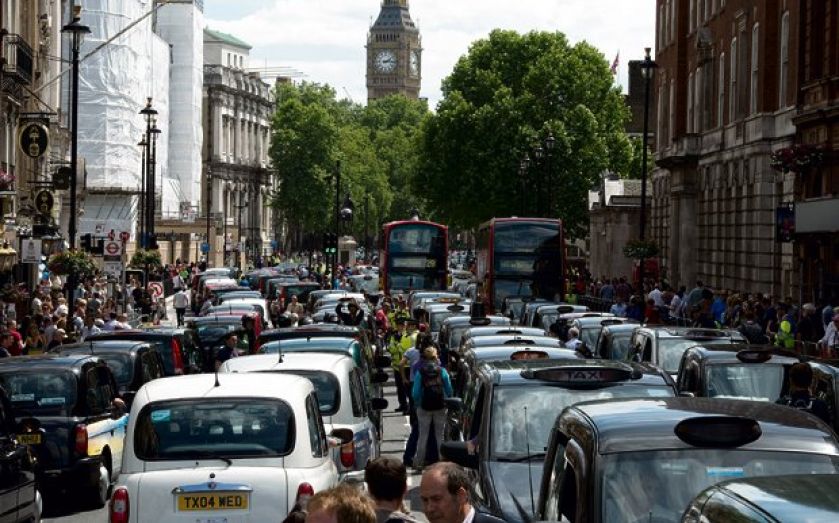Uber app vs black taxis: Cab war heats up

Taxi drivers bring central London streets to a standstill over Uber – yet smartphone app says it won the day
Thousands of black cabs caused gridlock in London’s west end yesterday as taxi drivers protested over the smartphone app Uber and warned that they could bring more chaos to the streets of the capital with further demonstrations.
Yet Uber claimed the action – which involved around 4,000 black cabs, according to Transport for London (TfL) – had backfired and resulted in a whopping 850 per cent rise in the number of people who had downloaded the company’s app, compared to a week earlier.
The company’s boss in the UK and Ireland slammed the protesting taxi drivers as being “stuck in the dark ages”. Jo Bertram said that it was Uber’s biggest day of sign-ups since the firm launched in London two years ago, adding that “Londoners are voting with their fingers”.
However, trade union Unite is supporting the taxi drivers and said it would not rule out repeated protests. Cab driver Frank Soper told City A.M. that he and fellow cabbies would be willing to protest again “month after month” if the dispute rolled on.
Yesterday’s action involved cabs driving towards Trafalgar Square for a 2pm start to the protest, blocking many major west end streets for roughly two hours.
The disagreement centres on Uber’s system, which calculates a fare based on the distance of a journey and the time it takes. Black cab drivers argue that this method, often deployed by rival minicabs, constitutes a taximeter. Meters are only allowed in black cabs, in London.
TfL has referred the issue to the High Court.
The travel chaos witnessed in London yesterday was mirrored in cities elsewhere in Europe including Paris, Madrid and Berlin. Up to 30,000 taxi drivers took part in protests in cities across the continent, yet their complaints were not well received by authorities in Brussels.
Neelie Kroes, vice-president of the European Commission, said that the demonstrations would not work, and that technological innovations spurring change in the economy were a “hard truth” that could not be avoided. They should embrace innovation that consumers favour rather than “hiding in a cave”, Kroes said.
Yet black cab drivers put forward their case at yesterday’s protest, insisting that their anger was directed at TfL and Mayor Boris Johnson, rather than at Uber itself.
Del Hoare, a member of the Licensed Taxi Drivers’ Association, said that Johnson and the TfL had “sold cabbies down the river”.
Mick Smith of the RMT accused Johnson and TfL of treating cab drivers “like mugs”. Peter Rose of Unite also said that Uber was just one part of cabbies’ complaints with TfL over its handling of a range of wider regulatory issues, with further direct action “unable to be ruled out”.
The protest caused huge disruption to businesses, residents and travellers in the area. Residents such as Tom Martin of Covent Garden expressed anger at the noise and air pollution resulting from the action, which he regarded as a protectionist attempt to deny consumers choice. “I have no sympathy in the slightest for the cabbies,” Martin said.
Tony Cortegaca, head doorman at the Savoy, said there had been significant disruption to guests arriving and leaving the hotel.
Charlotte Bowyer of the Adam Smith Institute, a think-tank based near the area in which the protest was held, added: “Black cab drivers argue that they are regulated to within an inch of their lives, which may be true – so it’s sad that they just want others to face the same treatment.”